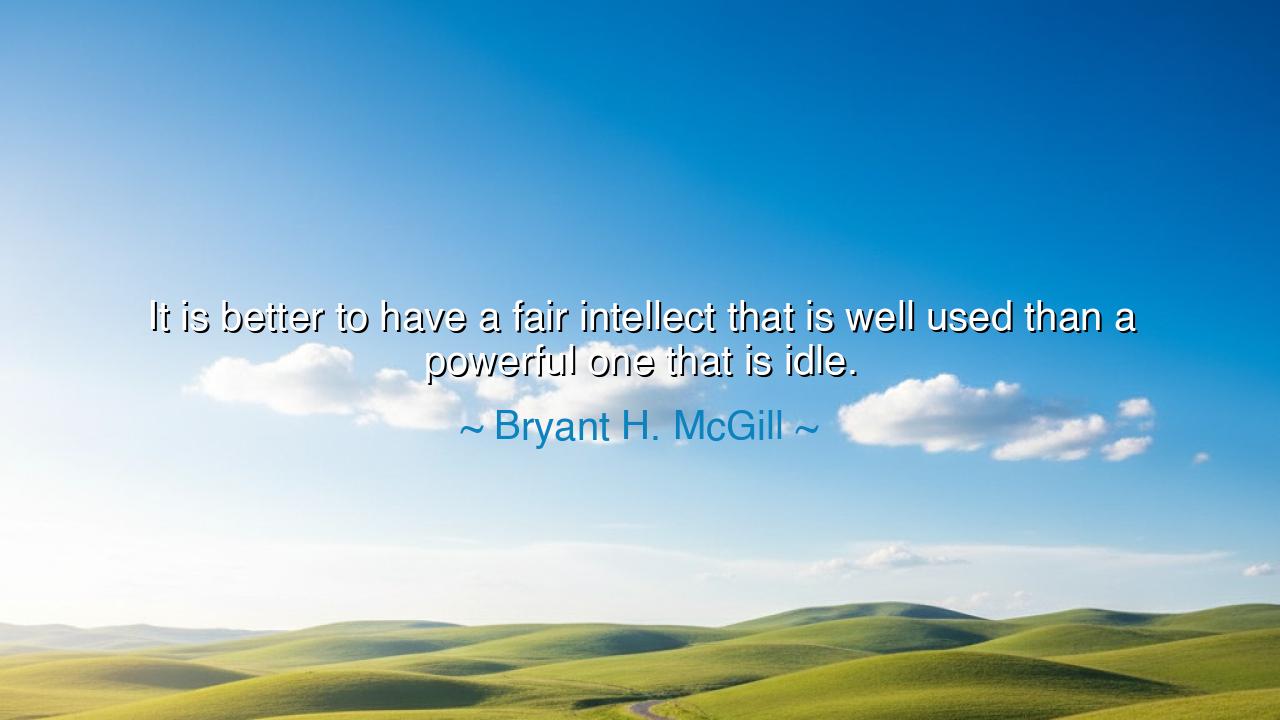
It is better to have a fair intellect that is well used than a
It is better to have a fair intellect that is well used than a powerful one that is idle.






In the quiet wisdom of ages yet unborn, Bryant H. McGill spoke words that pierce through vanity and awaken diligence: “It is better to have a fair intellect that is well used than a powerful one that is idle.” These words, humble yet mighty, remind us that greatness is not born from brilliance alone, but from the faithful use of what one has been given. The ancients understood this truth well: the seed that is planted bears fruit, while the seed hoarded in pride withers in its shell. Intellect, like any gift, must serve, must act, must create — or it becomes a monument to wasted potential.
To possess a powerful mind yet let it rust in idleness is like owning a sword and never drawing it, or having wings and refusing to fly. McGill’s wisdom warns us that unused talent is not virtue, but vanity — a silent betrayal of purpose. Better is the steady craftsman, who uses his modest tools with care, than the prodigy who dreams but never builds. The well-used mind, no matter how “fair” or ordinary, shines brighter than the dormant genius. For the former transforms effort into wisdom, while the latter transforms potential into regret.
This truth can be seen in the story of Thomas Gray, the poet who once said he was “born to blush unseen.” Though gifted beyond measure, he wrote but little, paralyzed by the shadow of perfection. His words, though few, were immortal, yet his life was marked by quiet frustration — for he had worlds within him that never found voice. Contrast him with Benjamin Franklin, whose intellect was not the most refined, but whose curiosity and labor turned every idea into reality. Franklin’s mind was not an idle flame — it was a forge. Through constant use, it grew vast, strong, and luminous. Thus, the lesson stands: greatness is not measured by brilliance, but by application.
Even nature bears witness to this law. The river that flows carves valleys and nourishes fields; the still pond stagnates and breeds decay. So it is with the mind. An idle intellect gathers dust, while the one in motion reshapes the world. The ancients honored not the thinker who withdrew from life, but the one who merged thought with action — the philosopher-king, the poet-warrior, the inventor who served humanity. They knew that wisdom that does not serve is as useless as fire that gives no light.
In the heart of McGill’s saying lies also a moral flame — a call to humility. The world celebrates power, yet it is discipline, not brilliance, that moves mountains. Many possess potential; few possess persistence. A fair intellect that toils faithfully will surpass the brightest star that refuses to rise. The wise do not ask, “How much have I been given?” but “How well have I used it?” For the gods themselves smile more upon the humble laborer of thought than upon the arrogant dreamer who never begins.
Let every soul remember this: the mind is a field, and ideas are seeds. If you leave the field untended, the weeds of doubt and distraction will claim it. But if you till it daily — reading, reflecting, striving, failing, beginning again — it will bear fruit beyond measure. Intelligence grows only in the hands that use it.
So the lesson, children of the future, is clear: Do not worship potential — cultivate it. Do not envy the genius — emulate the diligent. Use what you have, however small, and the heavens will multiply it. Begin your work, however imperfectly, and excellence will follow in time. For it is not the brilliance of the flame that endures, but its constancy.
In this, Bryant H. McGill speaks the eternal law of mastery: that the worth of the mind lies not in its power, but in its purpose. A fair intellect, well used, can light the world — while a great one, left idle, fades unseen into darkness. Therefore, let your thoughts become deeds, and your wisdom become service. In use lies glory, and in labor lies the immortality of the human spirit.






AAdministratorAdministrator
Welcome, honored guests. Please leave a comment, we will respond soon